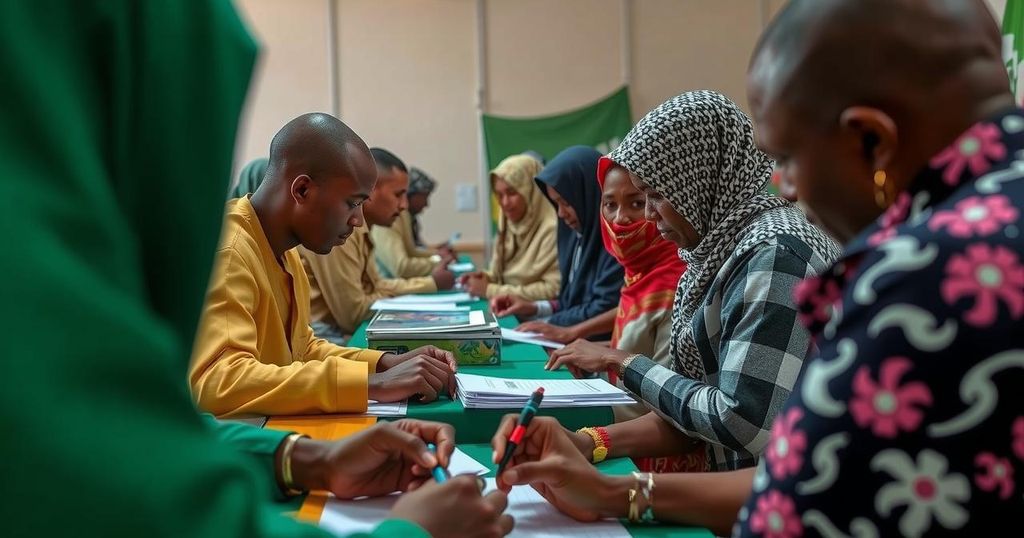Politics
AFRICA, ALLAH, DEMOCRACY, ETHIOPIA, FAISAL ALI WARABE, GOVERNANCE, GULF OF ADEN, IRRO, JUSTICE AND DEVELOPMENT PARTY, KULMIYE, MUSE BIHI ABDI, MUSE HASSAN YUSUF, NEC, PEACE, UNITY AND DEVELOPMENT PARTY, REGIONAL COOPERATION, SECURITY, SI, SOMALIA, SOMALILAND, SOMALILAND NATIONAL ELECTORAL COMMISSION, SOMALILAND POLICE FORCE, UCID, VOA SOMALI, WADDANI, WADDANI PARTY
Marcus Li
0 Comments
Peaceful Presidential Elections in Somaliland Amid Regional Tensions
Somaliland successfully conducted its presidential elections, with voting concluding smoothly on Wednesday evening. The Somaliland National Electoral Commission is currently counting votes, and results are expected by November 21. Incumbent President Muse Bihi Abdi seeks re-election against two opponents. The elections occur amidst tensions with Somalia regarding Ethiopia’s recent lease agreement with Somaliland, complicating the region’s quest for international recognition.
The recent presidential elections in Somaliland proceeded smoothly, with polls closing at 6 p.m. local time on Wednesday. More than 1 million registered voters participated across approximately 2,000 polling stations in this breakaway region of Somalia. The Somaliland National Electoral Commission (NEC) announced that vote counting had commenced, emphasizing the resolution of minor technical difficulties encountered at some stations. According to NEC Chairman Muse Hassan Yusuf, the results are expected to be announced by November 21. General Mohamed Adan Saqadhi, head of the Somaliland Police Force, confirmed the peaceful conduct of the election, appreciating its democratic nature. Three candidates competed for the presidency: incumbent Muse Bihi Abdi from the ruling Kulmiye party, Abdirahman Mohamed Abdullahi known as “Irro” from the Waddani party, and Faisal Ali Warabe from the Justice and Development Party (UCID). All candidates expressed a commitment to fostering democracy, stimulating economic growth, and achieving international recognition, which Somaliland has sought since its declaration of independence in 1991. However, the elections were overshadowed by ongoing tensions between Somaliland, Somalia, and Ethiopia. This discord stems from a recent agreement allowing Ethiopia access to a portion of Somaliland’s coastline, an arrangement viewed by Somalia as a breach of sovereignty. This situation has been exacerbated by previous diplomatic strains and allegations of interference by Ethiopia in Somalia’s internal affairs. Recent talks mediated by Turkey failed to reconcile these differences, highlighting the fragile nature of regional politics. Despite its quest for recognition, Somaliland maintains a functioning government with democratic practices and a stable political environment, marking its fourth presidential election since breaking away from Somalia. The peaceful election reflects Somaliland’s political maturity, amidst challenges involving its contentious relationships with neighboring Somalia and Ethiopia.
Somaliland is a self-declared independent region in northern Somalia that has not yet gained widespread international recognition despite functioning as a de facto independent state since the early 1990s. Following the collapse of the Siad Barre regime, the region established a government, institutions, and systems that allow for democratic elections. The current presidential election is significant as it showcases the political stability and maturity of Somaliland’s governance. However, Somaliland’s quest for recognition remains complicated by ongoing territorial and diplomatic disputes with Somalia and its engagements with Ethiopia, especially concerning a recent contentious memorandum of understanding regarding territorial access.
In conclusion, the recent presidential elections in Somaliland reflect both the progress of its democratic processes and the ongoing complexities of its political situation within the context of regional tensions. With candidates focused on economic development and international recognition, the future of Somaliland appears promising yet precarious, largely dependent on navigating its relationships with Somalia and Ethiopia. The commitment to a peaceful electoral process showcases Somaliland’s stability, even as it grapples with claims of sovereignty neighboring Somalia.
Original Source: www.voanews.com




Post Comment